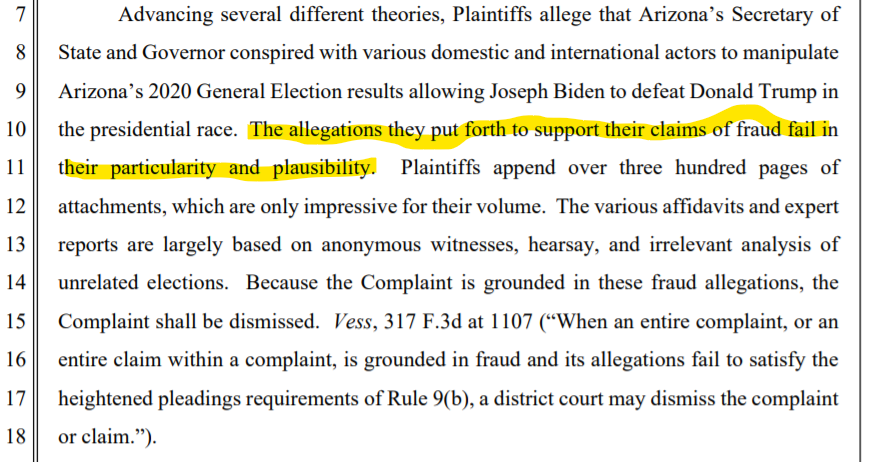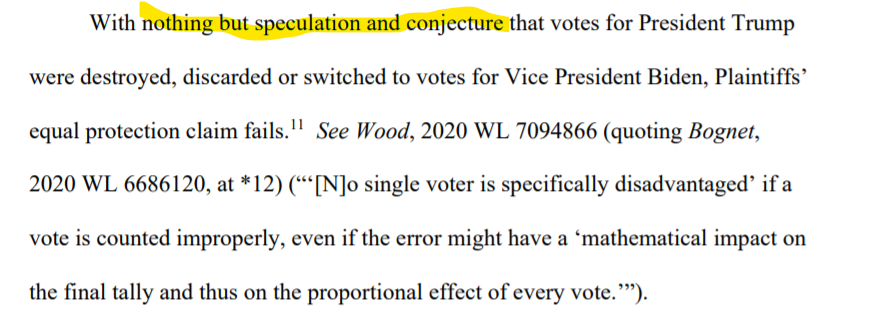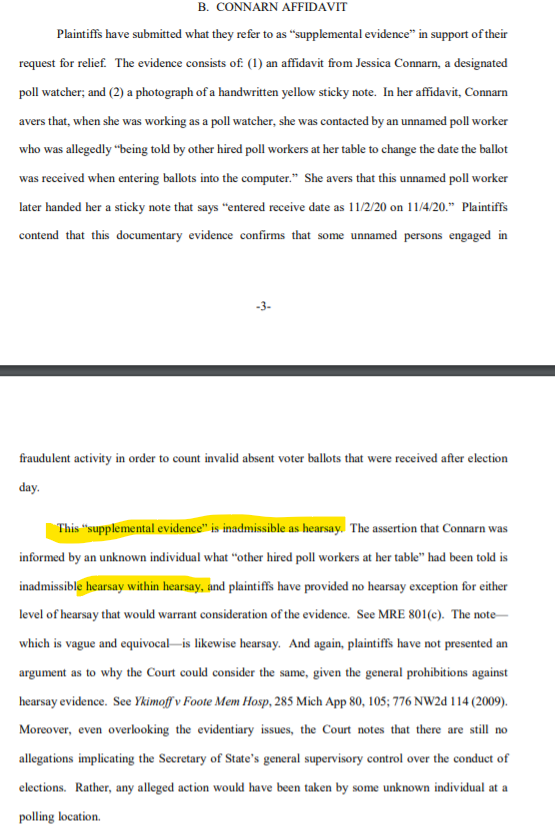More from Law
Over and over again, judges have gone out of their way to listen to the evidence and dismantle it, enjoy the carnage!
1/
Bowyer v. Ducey (Sidney Powell's case in Arizona)
"Plaintiffs have not moved the
needle for their fraud theory from conceivable to plausible"
This is a great opinion to start with. The Judge completely dismantles the nonsense brought before her.
2/
https://t.co/F2vllUhM2G

King vs. Whitmer (Michigan, Sidney Powell case)
"Nothing but speculation and conjecture"
This is a good one to show people who think affidavits are good evidence. Notice how the affidavits don't actually say they saw fraud happen in Detroit.
3/
https://t.co/NZAtqivWkL

Trump v. Benson (Michigan)
"hearsay within hearsay"
Another good one to show people who think affidavits are absolute proof.
4/
https://t.co/17GeGhImHF

Stoddard v. City Election Commission (Michigan)
"mere speculation"
/5
https://t.co/ekqYEqiIL9

The Michigan case in the US Supreme Court originally filed by Sidney Powell and Lin Wood was just distributed today for Conference on 02/19/2021!
— Truth (@1foreverseeking) February 4, 2021
Feb 03 2021 DISTRIBUTED for Conference of 2/19/2021. https://t.co/jZO624pf7j
Wisconsin
The Wisconsin case in the US Supreme Court is also
— Truth (@1foreverseeking) February 4, 2021
distributed for Conference on 02/19/2021!https://t.co/zkpTubcG1C
Georgia
This Georgia case, originally filed by Lin Wood, is alo distributed for conference on February 21, 2021!https://t.co/l7j43v5pfD
— Truth (@1foreverseeking) February 4, 2021
Arizona
This Arizona case is also distributed for conference on Febraury 21, 2021!https://t.co/56g1Fphg2l
— Truth (@1foreverseeking) February 4, 2021
Another Pennsylvania case. This is the most important one in my opinion. It shows the Republican Legislature broke the law when they created a mail-in ballot law in October, 2019, which they knew was against the state
Another Pennsylvania case distributed for conference February 21, 2021.
— Truth (@1foreverseeking) February 4, 2021
Filed by a Republican Congressman who lost his seat because PA Republican Legislature illegally created a mail in ballot law October, 2019, against the Constitution of PA.https://t.co/RYJE6ENZGk
To the extent that precedents matter in this trial, when hearsay has been challenged in past trials, it's been admitted if it's probative. And it's been noted that senators aren't *regular* jurors, but rather people of learning who can figure on their own how to weigh evidence.
— Ira Goldman \U0001f986\U0001f986\U0001f986 (@KDbyProxy) January 24, 2020
law stuff & will know what they can & can't consider. For instance, there is a long-held rule that a fact witness can't make legal arguments, only a lawyer. So what will happen in a motion for summary judgment, where the entire proceeding is on paper, will play out like this:
1) Defendant makes a motion for summary judgment. It includes a sworn declaration from some fact witness.
2) The declaration includes all sorts of legal arguments about why the defendant should win. Often the declaration includes arguments the brief didn't even make.
Defendants (especially DOJ-represented ones) often do this to get around the word or page-limits placed on briefs.
3) Plaintiff moves to strike the declaration for its inclusion of inadmissible legal arguments.
4) Judge denies the motion to strike, on the grounds that a ...
judge is a sophisticated consumer of evidence & can choose what to consider & what to ignore, unlike a jury.
The legal fiction behind this impeachment exception is that Senators are also smart enough to know what to listen to & what to ignore. Now, that may not be ACCURATE, ...

















